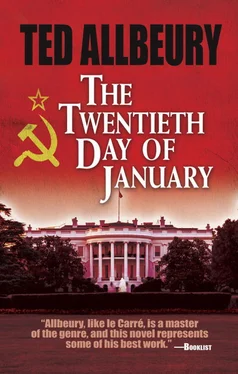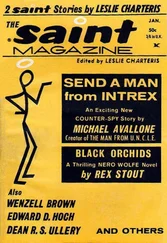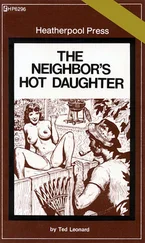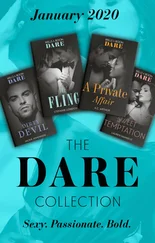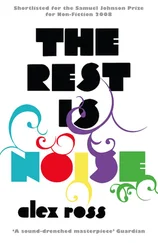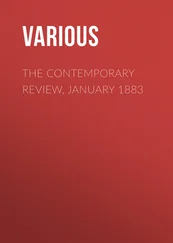But in two areas their fuses are shorter. One of the areas is hard drugs, and the other is diamonds. The special diamond squad in Amsterdam is constantly aware that a market’s reputation, which has taken a dozen decades to build, can be destroyed in a week. There’s not much goes on in the Amsterdam diamond market that the squad is not aware of. It doesn’t always do something about what it knows, because informers and sources might be identified that way; and there are more ways than one of skinning these particular cats. So when MacKay pushed his piece of paper across the Inspector’s desk he guessed that something very near honesty would be the best policy. A question or two would decide how near.
Inspector van Rijk pushed the paper back across the desk.
“Yes. They’re both big dealers. Both have international dealings.”
“If you particularly wanted Russian diamonds, which one would you go to?”
Van Rijk half-smiled and patted the ball back.
“You could get them from either.”
“At short notice?”
Van Rijk smiled openly.
“Mr. MacKay, these men deal in millions of dollars’ worth of stones every year. They can supply or buy anything, just so long as it exists.”
MacKay realized that it was going to have to be something very close to the truth that cracked this nut.
“Do you understand what I mean, Inspector, if I talk about ‘laundering’ money?”
“Yes. And to save you the question, yes, people do ‘launder’ diamonds from Russia.”
“Which of these two would be most likely to ‘launder’ diamonds from Russia?”
“Mijnheer van Elst.”
“Why him?”
“Because the other one is a Communist and he knows he would be suspect.”
“Is it illegal?”
“Indeed not. A man brings you Russian diamonds, you exchange them for South African diamonds to a slightly less value. There is no crime there.”
“So you have no objection to this sort of trade?”
“On the contrary, we have every objection. Particularly when they come from the Soviet Union. The official Soviet diamond dealing keeps absolutely to the rules. There is no need to ‘launder.’ But Soviet diamonds do come in unofficially and we object strongly. They can be used to depress the market, and we also have security objections.”
It was going to be almost the whole truth, so MacKay plunged in.
“We suspect a New York diamond dealer of working for the Soviets. We think he could be exchanging illicit Soviet diamonds for others. He has imported no Soviet diamonds so far as we know in the last ten years.”
Van Rijk shrugged.
“You mean Kleppe?”
MacKay sighed and leaned back in his chair.
“You know about him, then?”
Van Rijk stood up and walked over to a row of metal filing cabinets. He sorted through one of the drawers and pulled out two files. One thick one, and one which was almost empty. He sat down at the table and opened the thin file. There were three typewritten sheets and van Rijk read them through silently and slowly. Then he looked up at MacKay.
“I can’t show you these but I can tell you the parts that will interest you. But I shall need a request from Washington.”
“I’ll get CIA Langley to speak to you immediately.” Van Rijk shook his head slowly.
“It would have to be a request from the State Department to Foreign Affairs in the Hague.”
MacKay squinted sideways at van Rijk.
“I guess I’ll have to pass, Inspector. It would take days and I haven’t got days.”
He knew from the look on van Rijk’s face that the Dutchman didn’t believe his story. The Inspector sat there silently, waiting for him to continue. When he saw that the CIA man had nothing to add, van Rijk said, “Of course I could show you Kleppe’s file. He’s an American national.”
MacKay waited silently as the policeman opened the thick file and leafed through the pages. Van Rijk turned down the corners of several sheets and then looked up at him.
“It’s in Dutch so I’ll read it out for you. OK?”
“Fine.”
“Kleppe comes over here twice a year. He books in for two days at the Hilton. Pays the bill but he doesn’t stay there. He shacks up with a girl, Marijke van Aker. Very pretty, about twenty-eight, paints pot-boilers to be sold in Düsseldorf and Essen. He stays a week, usually. The first full day he buys a few stones at a number of merchant houses. Totals about ten thousand dollars. The second or sometimes the third day the girl goes to the Hague to a house on Groot Hertoginnelelaan.”
Van Rijk looked up smiling.
“You’ve heard of it?”
“No.”
“It’s the best whore-house in the Hague. Embassy people, politicians and film-stars. And very expensive. You don’t come out for less than a hundred and sixty guilders.”
MacKay tried to work it out in dollars but stopped calculating because he knew he would never remember the street. And van Rijk was going on.
“The girl goes to one of the private rooms and is visited by a man from the Soviet Embassy. Generally the same man. I can give you his name. He’s known KGB. He stays for an hour usually and he hands over a package which she brings back to Kleppe in Amsterdam.”
Van Rijk stopped. His eyebrows raised in query.
“So ask me.”
“Does he screw her?”
Van Rijk laughed. “Americans. Yes, he screws her, but that wasn’t the question I had in mind. I thought you might wonder how we know about the handover.”
“I’d guess you filmed it.”
“Right. Back to our mutual friend Kleppe. He exchanges the Russian stones for South Africans and Venezuelans. Van Elst filters the Russian stones through the market to other dealers and some as direct house-sales. Wholesale value of average purchase by Kleppe each trip about half a million dollars. Retail value about double, unmade-up. Five times that value as jewellery. Four months ago Kleppe made an extra trip. Using an Egyptian passport under the name Ali Sharaf he left Schipol on the Aeroflot flight to Moscow. He came back eight days later. Came back here to Amsterdam and took a flight the following day to New York via London. He neither bought nor sold diamonds.” He pursed his lips. “That’s about it, my friend.”
“Thanks. Can you give me the departure and return dates of the trip to Moscow and the flight numbers?”
“Sure.”
Van Rijk picked up a ball-point and, checking the file, wrote out the details on his pad, tore off the page and slid it across his desk to MacKay, who folded it twice and put it in his pocket.
“Can I invite you to a meal, Inspector?”
“Afraid not. We’ve got the English here tonight playing Ajax and I’ve got a ticket. Maybe next time, eh?”
They had fixed him an office-bedroom at the Consulate, and he sat down at the small desk and wrote out his report to Nolan. He ate while it was being encoded and transmitted, and then checked out the girl’s address in the telephone book.
It was an hour later when Nolan came through on the telephone.
“This report, Jimmy. Would your contact make a notarized statement?”
“They’d want a request from State.”
“Why isn’t Langley enough?”
“I don’t know. I think it’s their rules and regulations.”
“Right. You’re staying at the Consulate?”
“Yes.”
“Get them to transmit me photostats of those passenger lists. Both outward and return flights. OK?”
“OK.”
In Washington, the Netherlands ambassador was at the British embassy, so was Morton Harper. And medals were being worn to celebrate the anniversary of the declaration of independence by some part of the former empire. Harper and His Excellency van Laan had been allowed to retreat to the privacy of a spare bedroom. They sat like uneasy children on the spring beds, Harper with his hands in his pockets, and the ambassador with his head on one side expectantly.
Читать дальше
